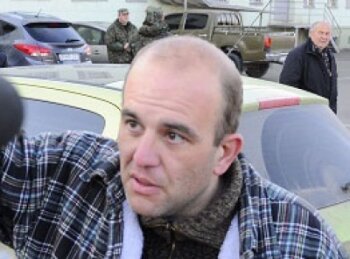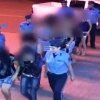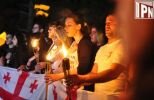Questions Remain About Lafankuri Operation
01 August, 2013
 Approximately a year has passed when so-called “Anti-Terrorist Sweeping Operation” was conducted in Lafankuri highland village in Telavi district, Eastern Georgia, in the Lopota Gorge. The site of the firefight is in close proximity to the international border between Georgia and the Russian Federation.
Approximately a year has passed when so-called “Anti-Terrorist Sweeping Operation” was conducted in Lafankuri highland village in Telavi district, Eastern Georgia, in the Lopota Gorge. The site of the firefight is in close proximity to the international border between Georgia and the Russian Federation.The much acclaimed human tragedy occurred in the Lopota Gorge at the end of August 2012, and many questions are still unanswered as to whether this was an antiterrorist operation or a staged ambush planned to clear up loose ends in the alleged government support for Chechen fighters. Georgian public, human rights organizations and the international community are left with many unanswered questions. Even the information that has been disseminated is confusing at best; it is very vague, intentionally or otherwise. Many things have been linked with Chechens in the last 10 years, and some pundits have gone as far as to find a nexus between Beslan and Boston via Georgian territory and the government of Mikheil Saakashvili.
On July 30, 2013, the Parliament held special hearing under the auspices of the Office of Georgian Public Defender, Ucha Nanuashvili. The Ombudsman came out with a Special Report on the status of Human Rights Protection, a review of conditions in 2012, summarizing many pressing issues. Special attention was paid to the Lopota Operation, its ramifications, and pointed out the unnecessary loss of life. The report has identified that the paramilitary group that was illegally deployed at the Georgian territory, and actually operated as a (terrorist group), specially trained, equipped and armed by the leadership of the MIA of that time, under its control and direct assistance. This amounts by all standards to the state-sponsored terrorism and the government knowingly providing material support to the people, who were considered as a terrorist group.
This report based on the careful research, showed contradictions in the statement between the members of previous government, the so-called official version of the events in the Lafankuri village and eye witness accounts. Based on the indications, and supported by the reports provided to the Ombudsman’s Office, and subsequent Georgian Public Defender’s conclusions on what transpired in August of 2012 at the Lopota Gorge, are absolutely true, and can be backed by the following concrete arguments and facts:
Former leadership of the MIA headed first by Vano Merabishvili and then Bachana Akhalaia since 2006, was intent to create guerilla groups or so-called “Georgian Tonton-Macout” paramilitary formations for seeking not only external (in case of war with Russia to oppose an asymmetric warfare against Russian forces) but also internal (oppressing the political opposition activities at the regional levels, conducting a terror campaign among the Georgian population and committing political murders) goals. This concrete policy-making process was supervised by then Deputy Ministry of Internal Affairs Amiran Meskheli and Head of the Counter-Intelligence Department, Police Major-General Giorgi Mazmishvili.
Neutralizing terrorists
Catching or killing a terrorist, real or otherwise, is used as a cover to conceal what is really going on behind the scenes. After the events, presumable suspicious statement was disseminated by the Islamic rebellion force leadership of the North Caucasus. The statement accused the Georgian side of arranging a “trap for the mujahidden of the Caucasus Emirate” by “betraying and killing the brave sons of the Caucasus”, adding that “this is by no means the first time they have taken such a treacherous step in a bid to appease the “Putin regime in Russia” and threatened revenge attacks in case the special operation was not stopped. The statement was renewed on June 5, 2013, by the Islamic Emirate leadership, a day before the Taliban clandestine combat group attacked the Georgian military post in Helmand province in Afghanistan. It means that the Islamic Emirate leadership was aware of the existence of the group on the Georgian territory that later on was annihilated by the special task units of the MIA on personal orders of Vano Merabishvili and Bachana Akhalaia. The operation took lives of three Georgian citizens and eleven members of the group of Chechen fighters. Ahmed Chataev, one member of the group, was arrested. He was severely wounded during the operation.
pproximately a year has passed when so-called “Anti-Terrorist Sweeping Operation” was conducted in Lafankuri highland village in Telavi district, Eastern Georgia, in the Lopota Gorge. The site of the firefight is in close proximity to the international border between Georgia and the Russian Federation.
The much acclaimed human tragedy occurred in the Lopota Gorge at the end of August 2012, and many questions are still unanswered as to whether this was an antiterrorist operation or a staged ambush planned to clear up loose ends in the alleged government support for Chechen fighters. Georgian public, human rights organizations and the international community are left with many unanswered questions. Even the information that has been disseminated is confusing at best; it is very vague, intentionally or otherwise. Many things have been linked with Chechens in the last 10 years, and some pundits have gone as far as to find a nexus between Beslan and Boston via Georgian territory and the government of Mikheil Saakashvili.
On July 30, 2013, the Parliament held special hearing under the auspices of the Office of Georgian Public Defender, Ucha Nanuashvili. The Ombudsman came out with a Special Report on the status of Human Rights Protection, a review of conditions in 2012, summarizing many pressing issues. Special attention was paid to the Lopota Operation, its ramifications, and pointed out the unnecessary loss of life. The report has identified that the paramilitary group that was illegally deployed at the Georgian territory, and actually operated as a (terrorist group), specially trained, equipped and armed by the leadership of the MIA of that time, under its control and direct assistance. This amounts by all standards to the state-sponsored terrorism and the government knowingly providing material support to the people, who were considered as a terrorist group.
This report based on the careful research, showed contradictions in the statement between the members of previous government, the so-called official version of the events in the Lafankuri village and eye witness accounts. Based on the indications, and supported by the reports provided to the Ombudsman’s Office, and subsequent Georgian Public Defender’s conclusions on what transpired in August of 2012 at the Lopota Gorge, are absolutely true, and can be backed by the following concrete arguments and facts:
Former leadership of the MIA headed first by Vano Merabishvili and then Bachana Akhalaia since 2006, was intent to create guerilla groups or so-called “Georgian Tonton-Macout” paramilitary formations for seeking not only external (in case of war with Russia to oppose an asymmetric warfare against Russian forces) but also internal (oppressing the political opposition activities at the regional levels, conducting a terror campaign among the Georgian population and committing political murders) goals. This concrete policy-making process was supervised by then Deputy Ministry of Internal Affairs Amiran Meskheli and Head of the Counter-Intelligence Department, Police Major-General Giorgi Mazmishvili.
Neutralizing terrorists
Catching or killing a terrorist, real or otherwise, is used as a cover to conceal what is really going on behind the scenes. After the events, presumable suspicious statement was disseminated by the Islamic rebellion force leadership of the North Caucasus. The statement accused the Georgian side of arranging a “trap for the mujahidden of the Caucasus Emirate” by “betraying and killing the brave sons of the Caucasus”, adding that “this is by no means the first time they have taken such a treacherous step in a bid to appease the “Putin regime in Russia” and threatened revenge attacks in case the special operation was not stopped. The statement was renewed on June 5, 2013, by the Islamic Emirate leadership, a day before the Taliban clandestine combat group attacked the Georgian military post in Helmand province in Afghanistan. It means that the Islamic Emirate leadership was aware of the existence of the group on the Georgian territory that later on was annihilated by the special task units of the MIA on personal orders of Vano Merabishvili and Bachana Akhalaia. The operation took lives of three Georgian citizens and eleven members of the group of Chechen fighters. Ahmed Chataev, one member of the group, was arrested. He was severely wounded during the operation.













































